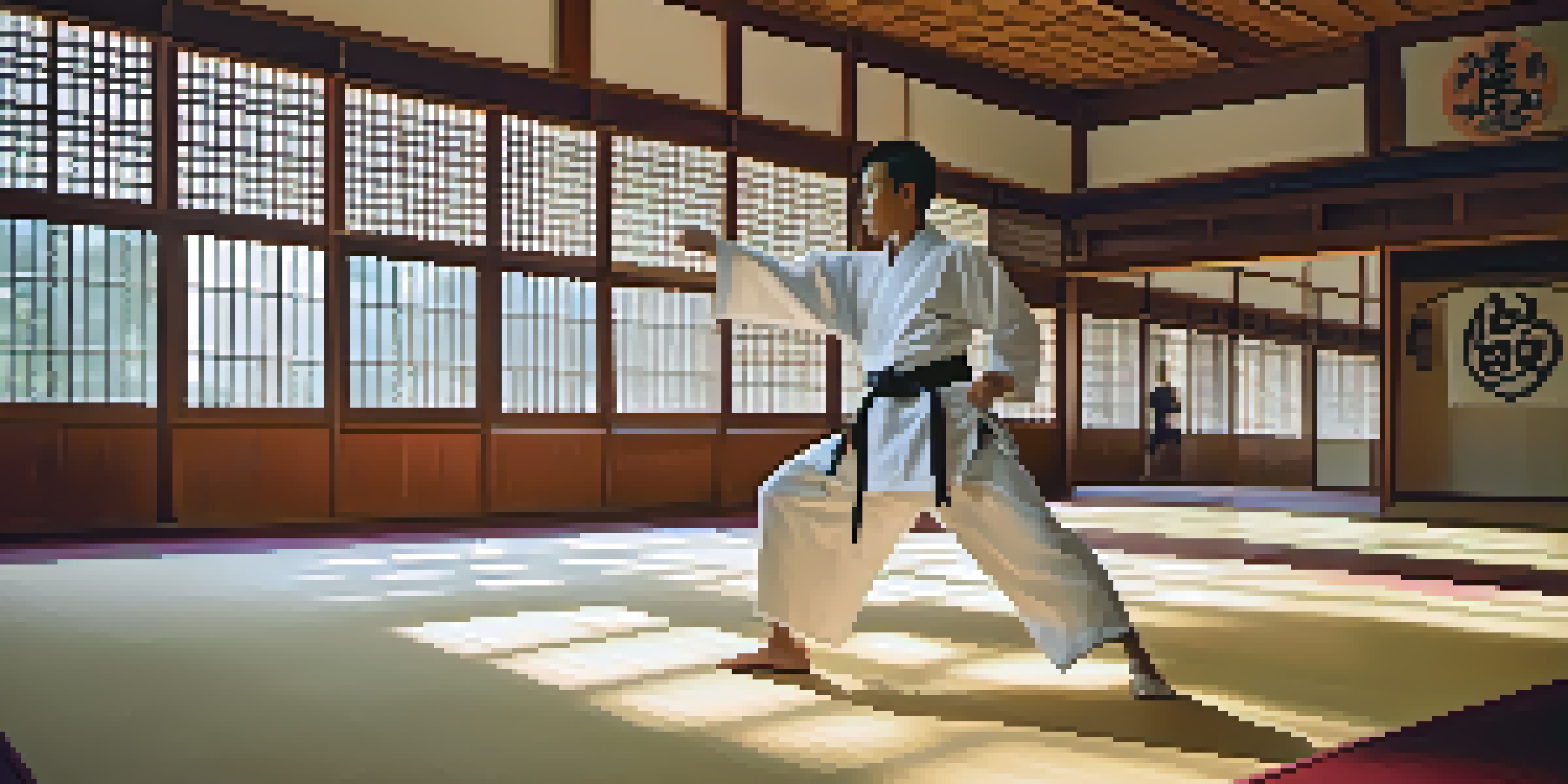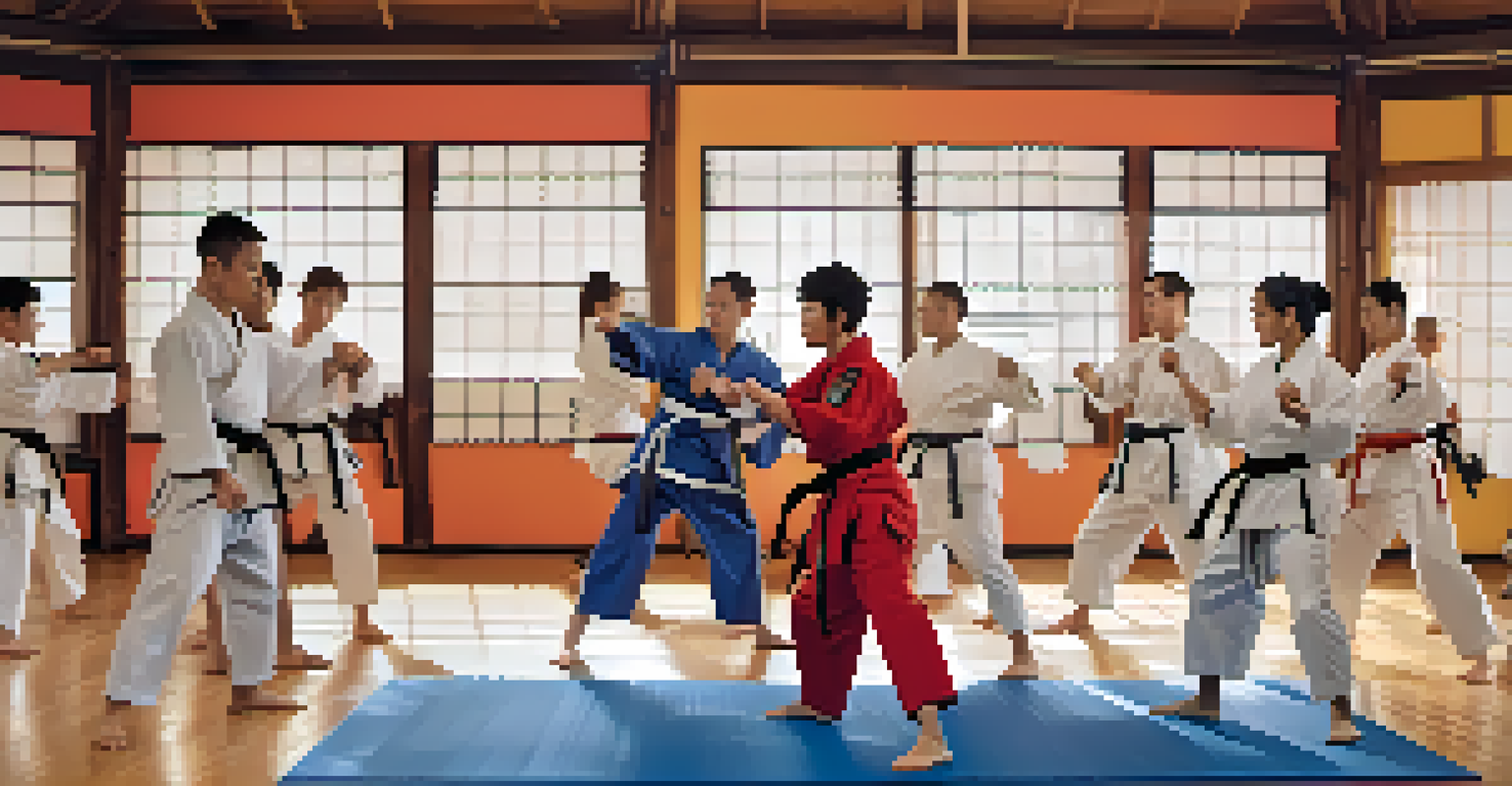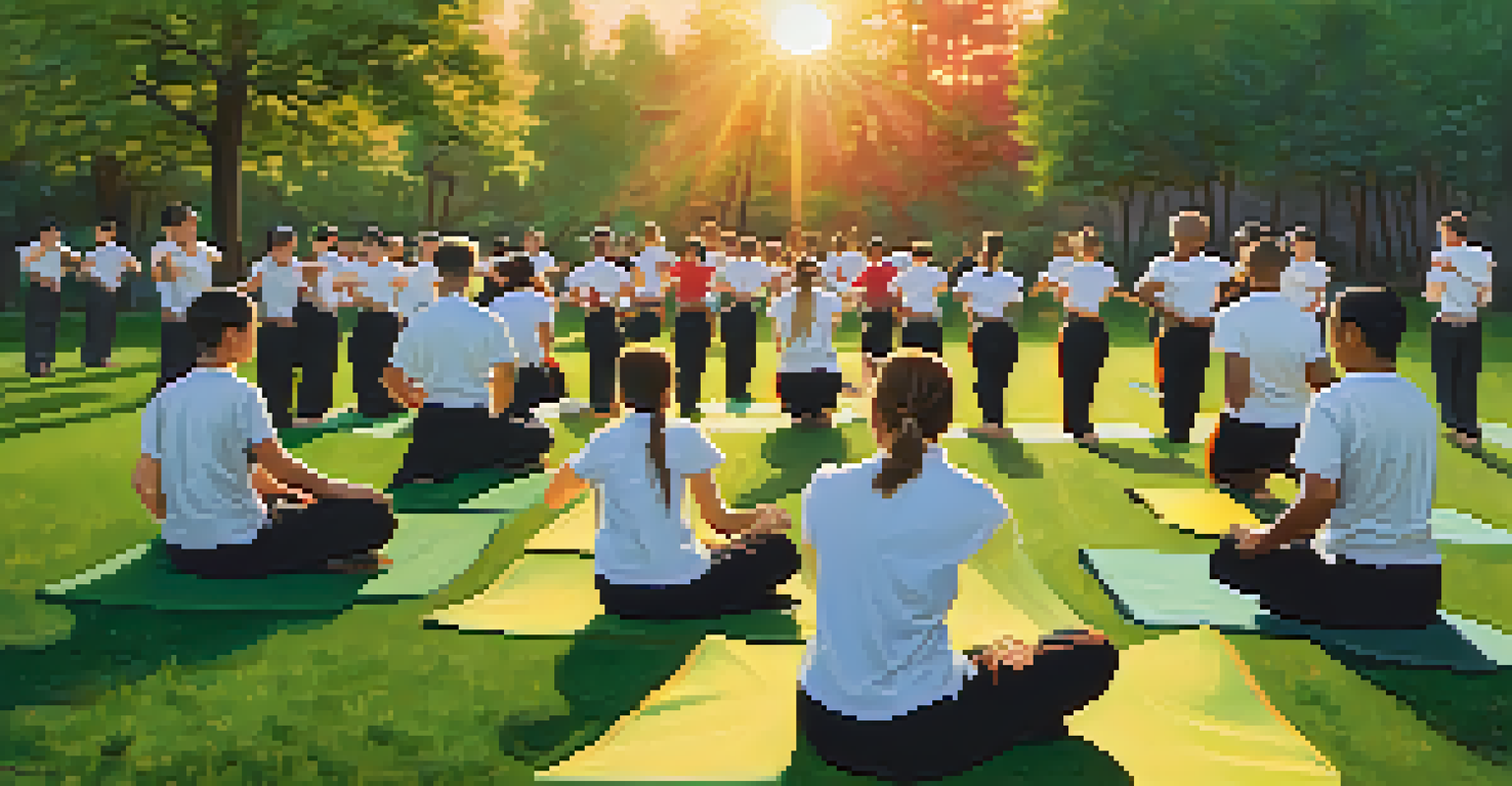The Therapeutic Benefits of Martial Arts for Mental Health

Understanding the Connection Between Body and Mind
Martial arts is often viewed as a physical discipline, but its impact on mental health is profound. The mind-body connection is an essential aspect of martial arts training, where physical movements are intertwined with mental focus and awareness. This synergy helps practitioners cultivate mindfulness, leading to reduced stress and anxiety levels.
The mind is everything. What you think you become.
For instance, when you practice your katas or engage in sparring, you’re not just exercising your body; you’re also training your mind to stay present. This focus on the moment can serve as a powerful distraction from daily worries, creating a mental space for relaxation and clarity. Over time, this practice can enhance emotional regulation and resilience against life’s challenges.
Moreover, the emphasis on discipline in martial arts fosters a sense of accomplishment. Each belt earned represents not just a physical achievement, but also a victory over mental barriers, boosting self-esteem and fostering a positive self-image.
Building Confidence Through Skill Development
One of the most significant therapeutic benefits of martial arts is the boost in self-confidence it provides. As individuals learn new techniques and improve their skills, they gain a sense of mastery over their bodies and actions. This newfound competence translates into greater confidence in everyday situations, helping to combat feelings of inadequacy or self-doubt.

For example, a beginner might struggle with basic moves, but as they practice and refine their techniques, they begin to feel empowered. This transformation is not just physical; it's psychological. The confidence gained on the mat often spills over into other areas of life, such as work or personal relationships, enhancing overall mental well-being.
Mind-Body Connection in Martial Arts
Martial arts training enhances mental health by fostering mindfulness, reducing stress, and promoting emotional resilience.
Additionally, setting and achieving goals in martial arts—whether it's mastering a new technique or preparing for a competition—can provide a sense of direction and purpose. This goal-oriented approach keeps practitioners motivated and engaged, which is crucial for maintaining mental health.
Stress Relief Through Physical Activity
Engaging in martial arts is an excellent way to relieve stress, thanks to the physical exertion involved. When you practice martial arts, your body releases endorphins, those feel-good hormones that help alleviate stress and promote a sense of well-being. This natural high can create a ripple effect, leading to improved mood and reduced anxiety.
Success is not the key to happiness. Happiness is the key to success. If you love what you are doing, you will be successful.
Consider a stressful day at work; attending a martial arts class afterward can help you blow off steam. The act of punching and kicking not only provides a physical outlet for pent-up emotions but also allows for a mental reset. You leave the dojo feeling lighter, both physically and mentally.
Moreover, the structured environment of martial arts training can create a sense of safety and community. Surrounding yourself with like-minded individuals who share similar goals fosters a supportive atmosphere, which can further reduce stress and enhance feelings of belonging.
Enhancing Focus and Mental Clarity
Martial arts training demands concentration and mental discipline, which can improve focus in everyday life. Practitioners must learn to tune out distractions and hone in on their movements, a skill that translates well to academic and professional settings. This increased focus is particularly beneficial for those struggling with attention-related challenges.
For instance, a student who practices martial arts may find that their ability to concentrate during classes improves. The mental agility developed through martial arts can lead to better problem-solving skills and enhanced cognitive flexibility, which are essential in both personal and professional environments.
Boosting Self-Confidence and Skills
As practitioners develop their martial arts skills, they gain confidence that positively impacts various aspects of their lives.
Additionally, the mental clarity gained from martial arts can help individuals make more thoughtful decisions. With a sharper mind, practitioners are better equipped to handle stressors and challenges that life throws their way, promoting overall mental health.
Fostering Discipline and Routine for Stability
Martial arts training instills a sense of discipline and routine, which can be incredibly beneficial for mental health. Regular practice helps create a structured schedule in which individuals can dedicate time to personal growth and self-improvement. This routine acts as an anchor, providing stability in the often chaotic world we live in.
For example, committing to a weekly martial arts class can create a sense of accountability. Knowing that you have a class to attend encourages you to prioritize your well-being, making it easier to resist distractions and negative habits. This discipline can spill over into other aspects of life, promoting healthy habits and routines.
Moreover, the discipline learned in martial arts can help individuals cope with setbacks and adversity. Practitioners learn to persevere through challenges, which can enhance resilience and a growth mindset, crucial traits for maintaining mental health in tough times.
Creating a Supportive Community and Social Connections
Martial arts classes often foster a strong sense of community, which can be a vital resource for mental health. Training alongside others creates bonds and friendships that offer emotional support and camaraderie. This sense of belonging can help combat feelings of isolation and loneliness, which are common contributors to mental health issues.
When you step onto the mat, you're not just engaging in physical activity; you're also joining a community of individuals who share similar goals and values. This social support can be incredibly uplifting and provides a network to lean on during challenging times.
Community and Support in Training
Martial arts classes create a sense of belonging and emotional support, which is crucial for combating feelings of isolation.
Furthermore, participating in group classes helps improve interpersonal skills and communication, which can enhance social confidence. These skills are crucial not only within the martial arts community but also in broader social interactions, making it easier for individuals to connect with others in their lives.
Promoting Emotional Regulation and Coping Strategies
Martial arts training teaches valuable emotional regulation techniques that can be beneficial in daily life. Through sparring and controlled scenarios, practitioners learn to manage their reactions and emotions in high-pressure situations. This ability to remain calm under stress is crucial for mental well-being.
For example, a martial artist may learn to control their adrenaline and maintain composure during a sparring match, which can translate to better emotional management in real-life conflicts or stressful situations. This practice of self-control fosters resilience and equips individuals with coping strategies for dealing with life's ups and downs.

Additionally, martial arts often incorporate elements of meditation and breathing techniques, which further enhance emotional regulation. By learning to focus on breath and presence, practitioners can develop tools to navigate anxiety and stress more effectively, leading to improved mental health overall.